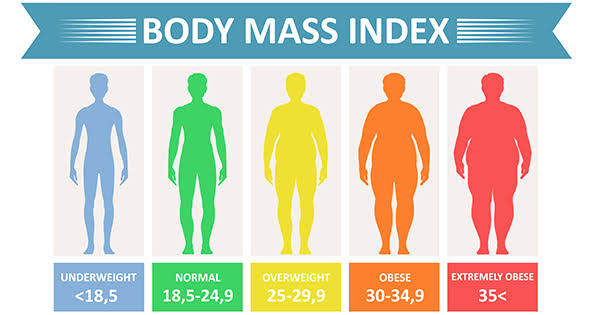
Body Mass Index (BMI) is a mathematical calculation that estimates a person’s health status based on their height and weight. BMI is generally used to assess a person’s risk for various diseases such as diabetes, cardiovascular diseases, stroke and many more (CDC, 2019).
BMI is calculated by dividing body weight (in kilograms) by the square of body height (in meters).
BMI Classification
- Below 18.5- Underweight
- 18.5-24.9- Healthy weight
- 25.0-29.9- Overweight
- 30.0 and above- Obesity
Health Risks of Being Underweight, Overweight or Obese
According to the World Health Organization (WHO), there are more overweight/obese people globally than underweight people. Also, about 2.8 million adults die annually as a result of being overweight or obese (WHO, 2019). Being underweight is linked to nutritional deficiencies especially iron-deficiency anemia and other health issues such as delayed wound healing, hormonal imbalance, increased susceptibility to infection and osteoporosis (weak & brittle bones) (CDC,2019).
As BMI increases over 25kg/m2, the risks increase for several health conditions like heart diseases, type 2 diabetes, hypertension, stroke, osteoarthritis (joint pain & stiffness), interrupted breathing during sleep (sleep apnea), depression and anxiety (CDC, 2019).
How to maintain a healthy BMI
- Eat balanced and nutritious diets with low calories
- Exercise regularly
- Get sound sleep of at least 7-8 hours per day
- Stay hydrated (3.7 liters of fluid per day for men and 2.7 liters for women)
Do you know your BMI? What other ways can people maintain a healthy BMI?